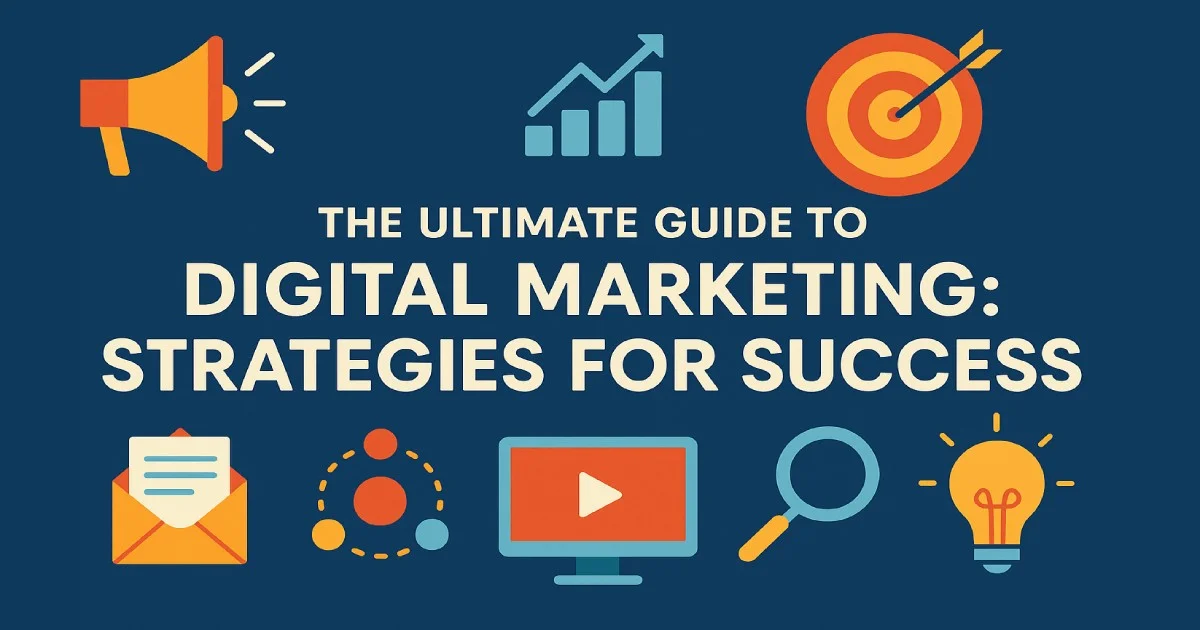In today’s hyper-connected world, digital marketing has become an essential tool for businesses of all sizes to reach, engage, and convert their target audience online. Whether you're a small business owner, a marketing professional, or an entrepreneur looking to scale, understanding the fundamentals of digital marketing is key to achieving long-term success in the digital landscape.
This ultimate guide to digital marketing will walk you through the most effective strategies — from search engine optimization (SEO) and content marketing to social media, email campaigns, pay-per-click (PPC) advertising, and more. You'll learn how each channel works, why it matters, and how to use it to meet your specific marketing goals.
By the end of this guide, you'll have a comprehensive understanding of the digital marketing ecosystem and practical steps you can take to grow your brand, drive more traffic, generate leads, and increase your return on investment (ROI).
Creating a Digital Marketing Strategy
To succeed in digital marketing, businesses need to have a clear strategy in place. This involves identifying the target audience, setting marketing goals, and selecting the most effective digital marketing channels to achieve those goals. A well-planned digital marketing strategy should also include a content marketing plan, which involves creating and distributing valuable, relevant, and consistent content to attract and retain a clearly defined audience.
When creating a digital marketing strategy, businesses should also consider their budget and resource allocation. Different digital marketing channels require different levels of investment, and businesses need to allocate their resources effectively to achieve their marketing goals. For example, a business may choose to allocate a larger budget to PPC advertising, while also investing in SEO and content marketing.
Search Engine Optimization (SEO)
🔍 Key Areas of SEO:
-
On-Page SEO: Optimizing page titles, meta descriptions, headings, keywords, and content quality.
-
Off-Page SEO: Building backlinks, improving brand authority, and earning trust signals from other websites.
-
Technical SEO: Ensuring fast page speed, mobile-friendliness, proper indexing, secure HTTPS, and structured data.
🛠 Essential Tools:
-
Google Search Console
-
Ahrefs / SEMrush
-
Yoast SEO / Rank Math (for WordPress)
A well-optimized website attracts consistent, high-intent traffic, often without ongoing ad spend, making SEO a long-term investment that pays off over time.
The Role of Content in Digital Marketing
Content is a crucial aspect of digital marketing and involves creating and distributing valuable, relevant, and consistent content to attract and retain a clearly defined audience. This can include blog posts, social media posts, email newsletters, and other types of content. High-quality content can help businesses to establish their brand voice and build trust with their target audience.
In addition to its role in attracting and retaining customers, content can also be used to drive conversions. For example, a business may create a series of blog posts that provide valuable information to potential customers, and then use a call-to-action (CTA) to encourage them to sign up for a free trial or make a purchase.
Measuring and Optimizing Digital Marketing Campaigns
To achieve success in digital marketing, businesses need to be able to measure and optimize their online campaigns. This involves using analytics tools to track key performance indicators (KPIs) such as website traffic, conversion rates, and ROI. By monitoring these KPIs, businesses can identify areas for improvement and make data-driven decisions to optimize their marketing strategies.
Some of the key metrics to track in digital marketing include website traffic, social media engagement, email open rates, and conversion rates. By monitoring these metrics, businesses can gain insights into the effectiveness of their online campaigns and make adjustments as needed.
The Future of Digital Marketing
The world of digital marketing is constantly evolving, with new technologies and trends emerging all the time. Some of the key trends that are currently shaping the industry include the rise of artificial intelligence (AI), the increasing importance of mobile marketing, and the growing use of video content.
As the digital landscape continues to evolve, businesses need to stay ahead of the curve to remain competitive. This involves staying up-to-date with the latest trends and technologies, and being willing to adapt and evolve their marketing strategies as needed.
Conclusion
In conclusion, digital marketing is a crucial aspect of modern business and involves using various online channels to promote products or services. By understanding the different digital marketing channels, creating a clear strategy, and measuring and optimizing online campaigns, businesses can achieve success in the digital age. Whether you're just starting out in digital marketing or looking to take your online campaigns to the next level, this comprehensive guide has provided you with the insights and tips you need to succeed.

